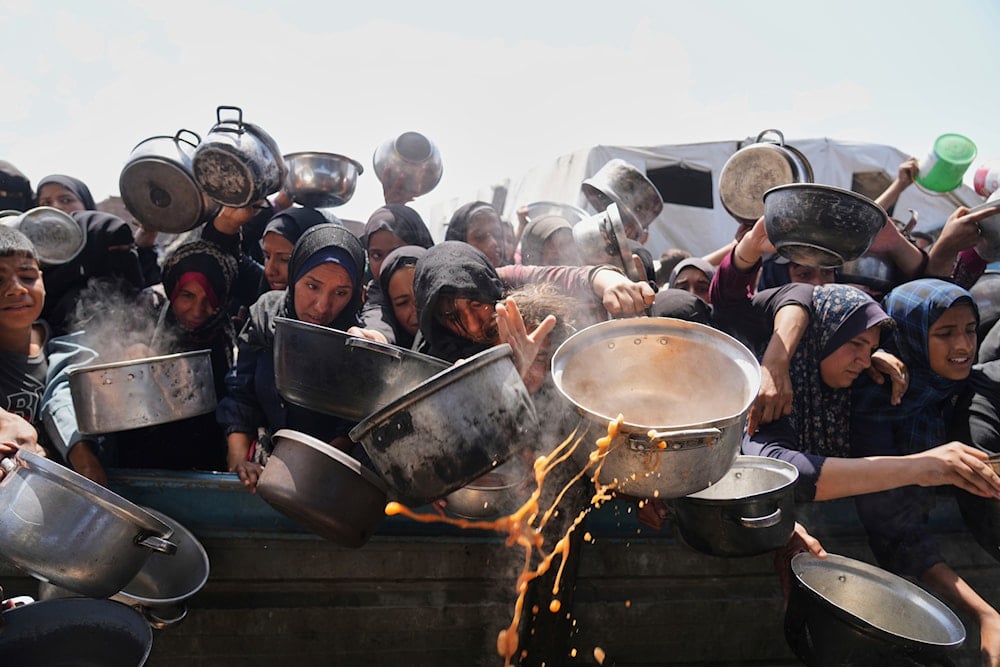Netherlands pushes EU review of 'Israel' trade deal over Gaza crisis
The Dutch foreign minister has urged an urgent review of the EU-"Israel" trade deal, citing "Israel’s" blockade of Gaza and potential breaches of international humanitarian law.
-

Palestinians struggle to get donated food at a community kitchen in Khan Younis, Gaza Strip, Monday, May 5, 2025 (AP)
The Dutch government, long one of "Israel’s" closest EU allies, is now pushing for an urgent review of the EU-"Israel" trade deal, Dutch Foreign Minister Caspar Veldkamp told The Guardian, citing Gaza’s humanitarian crisis.
Veldkamp condemned "Israel’s" blockade of aid to Gaza as “catastrophic, truly dismal” and a blatant violation of international humanitarian law, according to The Guardian on Wednesday.
Former Dutch ambassador to "Israel" Ron Veldkamp, has written to the head of the European Union Foreign Service Kaja Kallas requesting an urgent review by stating his belief that "Israel" is now in breach of the association agreement, and noted that he expects the issue to be discussed at a two-day informal EU foreign ministers meeting in Poland starting Wednesday.
In his letter to Kallas, Veldkamp stated that "Israel’s" proposed system of aid distribution seemed inconsistent with the "principles of neutrality, impartiality, and independence."
Veldkamp, explaining his position, stated that starving the people of the Gaza Strip is against international law, morally wrong, dangerous, and not in "Israel’s" own interest, while also noting that the chances for a ceasefire appear "very, very slim," which makes the situation "unbearable.
He added that the Dutch government would veto any extension of the EU-"Israel" action plan, which implements the association agreement that came into force in 2000, and emphasized that Article 2 of the EU-"Israel" association agreement stipulates their relations are based on respect for human rights and democratic principles.
Speaking to The Guardian in London after a meeting with British Foreign Secretary David Lammy, he said that the Netherlands was "very concerned about the current conduct of the war, especially since the ceasefire’s end on the 18th of March, and the blockade of humanitarian aid."
He further questioned Netanyahu's priorities by arguing that a ceasefire would be the most effective approach for securing the release of hostages.
“The criticism in Israel is increasing against the prime minister that he does not give enough priority to the release of the hostages, and he has now stated also that he doesn’t give that ultimate priority, but he gives the priority to fighting Hamas,” Veldkamp stated.
'Israel' enforces siege on Gaza
On March 2, 2025, "Israel" initiated a comprehensive blockade on the Gaza Strip, halting all humanitarian aid deliveries through key crossings, including Rafah, Beit Hanoun, and Karem Abu Salem.
This action followed the expiration of the first phase of a ceasefire agreement and was intended to force Hamas into accepting a new ceasefire proposal, reneging on the original deal reached. The blockade has led to severe shortages of food, fuel, and medical supplies, exacerbating the humanitarian crisis in Gaza.
As of April 25, 2025, the United Nations World Food Program reported that its food supplies in Gaza had been depleted due to the ongoing blockade. Approximately 80% of Gaza's over 2 million residents rely on humanitarian aid, and markets face extreme shortages with soaring prices, rendering essentials unaffordable.
The blockade has been condemned by rights groups as a potential war crime. Malnutrition is escalating rapidly, with the UN reporting that 3,700 children are suffering acute malnutrition in March, an 80% increase from the previous month
Two months after the initiation of the blockade, Amnesty International has demanded that "Israel" immediately end its brutal blockade of Gaza, now in its third month, condemning the siege as a genocidal war crime that weaponizes starvation and illegally punishes civilians collectively.
The UN's OCHA spokesperson, Olga Cherevko, warned that Gaza faces catastrophic conditions, with water access now "impossible" and food supplies depleted, describing violent clashes over scarce resources.
She painted a dire picture: children traumatized, elders scavenging for survival, collapsing hospitals, and critical fuel shortages—all while Israeli authorities continue blocking aid through closed crossings.

 4 Min Read
4 Min Read








